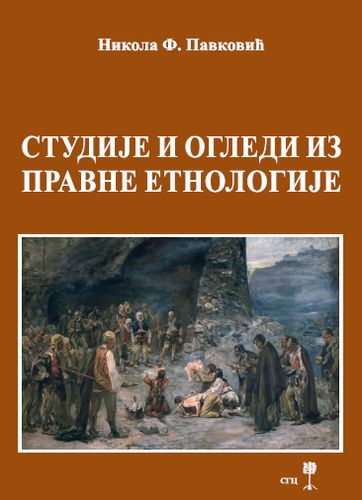
We kindly inform you that, as long as the subject affiliation of our 300.000+ articles is in progress, you might get unsufficient or no results on your third level or second level search. In this case, please broaden your search criteria.

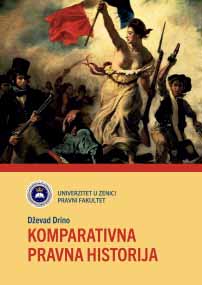
Comparative Legal History is a textbook on general history of state and law for the students of the Faculty of Law at the University of Zenica. It covers prehistory and the development of states and law in the Euro-Mediterranean region in the classical period, antiquity, Middle Ages, until modern age. It also covers the legal thought of the Far East (India, China, Japan) and Central East (Egypt, Babylon, the states of the Hittites and Jews), as well as Ancient Greece, medieval Germanic countries, Byzantine, Russia, England, Arabic and Ottoman Empires, including the religious legal systems of Sharia and Canon law. In the modern period, it analyses the laws existing in cities, the origin of contemporary European states, the foundation of the United States of America, legal consequences of France’s bourgeois revolution and the origin and development of socialist states and laws. The textbook contains a list of recommended literature (133 works) and index of names and geographic places. It is recommended to students of law, history, political sciences, and international relations as a useful resource to master the basic terms of historical development of countries and legal systems. It was written in Bosnian (Latin) language on 257 pages in total.
More...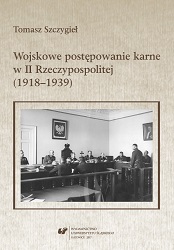
The book is concerned with military criminal procedural law applied in the military judiciary of the inter-war period (1918–1939). This problem has so far been underexplored, with the evolution of this branch of law after the year 1918 forming a major research gap.Apart from the institutions unique to this branch of law, the monograph discusses theorganisation of the court-martial system of this time and the origins of the major sources of itslaw. It focuses on the specific relations between participants in the military criminal procedure of this period, relations that determined its unique character. It presents the evolution of particular military legal institutions – also in the comparative and historical perspective – and the influence of general criminal procedural law of the time on their development. The book takes up the timeless problem of the distinctiveness of military law and the military judiciary on the one hand, and the general system of law on the other. It addresses questions concerning the character of the court-martial system, its procedural law and its possible future. The volume presents the whole course of military criminal procedure, including the problem of penalty execution. It is supplemented with photographs of places, persons, and events connected with the inter-war court-martial system, made available by The National Digital Archives in Warsaw.
More...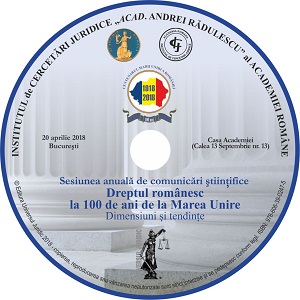
“Pravila de la Govora” represents the first collection of legal-canonical and civil laws, written in Romanian and using a Cyrillic alphabet. It represents a code of laws punishing the violation of the Romanian traditions and customs; it also represents a synthesis of the byzantine law applied in the traditional Romanian area.The princeps edition of the paper has been printed in 1640 at the Govora Monastery from Valcea County. In 1884 the Romanian Academy published a second edition of this paper in Romanian, by using the Latin alphabet. The third edition, published in 2016 with the blessing of the Ramnicu Valcea Archdiocese. In fact, the launching of this paper, event to which I took part, together with other national and local personalities, in the presence of a large audience, represents the reason for which I am writing the current article.
More...
The happy context of preparing the country for an exceptional national event - Celebration of the Great Union, Commemorative Year of the Makers of the Great Union of 1918 and the Homage Year of Unity of Faith and Nation throughout Romania and the territories inhabited by Romanians - may also be for Romanian law, the moment of its relaunch, our legal culture. The harmony and consistency of the legal culture, its viability and originality, its romantic and democratic character are expressed in the way that the Romanian scholars, throughout the centuries, from the chroniclers to the exegetes today, comprehensible to their pioneering mission, the creators and leaders of the progress of culture, art and science, have understood to make their political and practical actions - manifested by the establishment of publications, educational institutions and national-cultural societies, with a primary role in the development of the Romanian people's self-consciousness, his great aspirations - a belief in their general activity - creative for the public benefit. Of course, the militant character of our legal culture has often been spoken of as a specific feature, highlighted in all the crucial moments in the history of the Romanian people, a history linked by a nation and a national state, to a particular territory where the earth leaves its way the soul of those who break it.
More...
This study has the following title: Selective aspects regarding the evolution of the regulations regarding the judiciary in the Romanian constitutions and in the Romanian law 100 years after the great unionUsing a Key- Scheme, the following parts of the study are analyzed successively, called: 1. Preamble. 2. The identification of the constitutional regulations on the judicial power in the Romanian constitutional system - selective aspects. 3. Romanian doctrinal references on the judicial power. 4. Judicial references on the judiciary in the decisions of the Constitutional Court of Romania. 5. Conclusions.
More...
The sovereignty of the people can remain a simple fiction when the people as a whole do not become aware or not aware of the complete and complex role they have as the sole sovereign title holders of the right of state power. In the chronology of international stages, sovereignty was understood to be the quality of not being the object or "subject" to any other matter of law. It therefore presupposes the independence of the state and the fullness of its competences in the sphere of international relations.
More...
Alexandru Petrescu was the president of the law courts that imposed the heaviest sentences for political offences in the 1950s. Petrescu’s inclination towards corruption and compromise, his versatility and the ability to get in contact with people at the highest political level, made him a reliable man during all the political regimes. Thus, he was selected for the highest offices. Until 1942 Petrescu imposed heavy political sentences on legionnaires and communists. Between 1942 and 1944 he was appointed Director General of the Directorate for Prisons by Ion Antonescu. Although he was accused of war crimes, after 1944 he became pawn in the communists’ attempt to annihilate the Romanian elite through judicial procedures.Finally, the general was appointed President of the Military Court of M.A.I. departments, the highest court of appeal for political trials. Petrescu’s political obedience did not prevent him from delivering favorable verdicts to some defendants in exchange for favors. For that reason he was called the “black market of justice”.
More...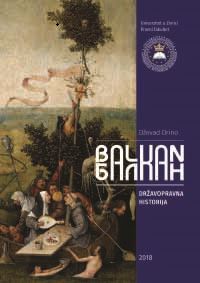
The textbook "The Balkans – The Legal History of the State" is the first work of this title in this region and it is intended for the students of law, as well as for other students since it provides an overview of the history of the development of the 11 Balkan states and their legal systems from antiquity to modern times. In the first part - The History of the States (p. 1-92), the Greek and Roman period of development, the Middle Ages, the emergence of the Slavic and other Balkan states, the hidden minorities of the Balkans (Jews, Roma, Vlachs), the Ottoman Empire and modern states in the Balkans were analyzed. The second part - The History of Law (p. 93- 211) encompasses the oldest Greek and Roman legal traditions, Medieval Law (Byzantine Law, Original Slavic Law, etc.), religious legal systems in the Balkans (Jewish, Canon, and Sharia law), as well as the Modern Law. The book is consisted of Introduction (IX-XV), 211 pages of text, bibliography of about 600 units (p. 212-240), and a book index (p. 240-258). The author of the book is Prof. Dževad Drino, PhD, Head of the Department of History and Law at the Law Faculty of the University of Zenica. The publisher is the University of Zenica (Bosnia and Herzegovina), while the reviewers were Prof. Salmedin Mesihović, MD, PhD, from the University of Sarajevo, and Prof. Abramac, MD, PhD, from New York University, USA.
More...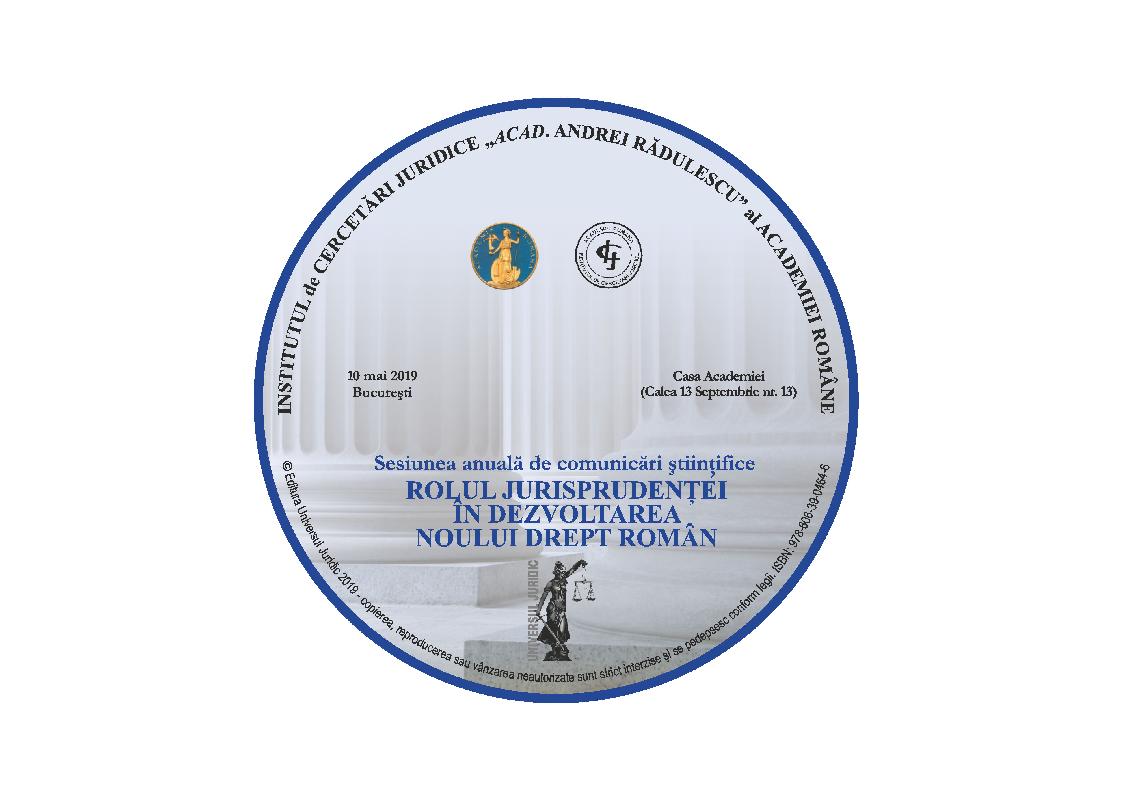
Romanian jurisprudence has developed unequally, alternating between tradition and innovation, between linearity and leaps from a system of national legal thinking to some moment innovations.The leaps from a dominant ideological system, to another system of ideological thinking, from tolerance to intolerance, were elements that marked the jurisprudence and implicitly the evolution of Romanian law.
More...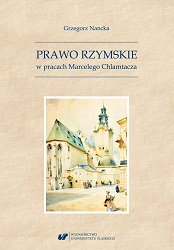
This dissertation aims to answer the question of whether Marceli Chlamtacz may be considered a scholar who made a significant contribution to the development of Roman Law studies and if so, why he is not as well remembered as other Polish Romanists of his time. The dissertation presents not just the silhouette of Marceli Chlamtacz, but also – most importantly – his scientific output. Furthermore, an attempt has been made in the dissertation to determine whether Marceli Chlamtacz treated research into Roman Law as a dogmatic analysis of specific legal institutions detached from his times, or whether he considered it as a means to understand and shape the law of his own times. The dissertation presents also Chlamtacz’s scientific relations with other Roman Law scholars. The dissertation encompasses an introduction, four chapters, and a conclusion. The first chapter presents a biography of Marceli Chlamtacz. It illustrates not just his road to earning his professorship in Roman Law, but also describes the period of his life that was devoted to the city of Lviv, whose devoted citizen he was. This chapter furthermore presents an analysis of his didactic activity and outlines the thematic scope of his lectures and issues discussed therein. The second chapter concentrates on Marceli Chlamtacz’s academic output in the field of property law. This part of the dissertation discusses his work on traditio in Roman law, based on which he was granted his venia docendi in Roman Law. Moreover, it presents a detailed analysis of Chlamtacz’s works on profits, focusing not just on his own output, but also on its reviews. The chapter closes with an analysis of the scholar’s other works, less closely related to Roman Law. The third chapter encompasses an analysis of Marceli Chlamtacz’s works on liabilities and obligations. It focuses on his habilitation lecture on contractual penalty, and his dissertations on guarantees, real contracts and means of redress. It also discusses his shorter works, such as entries published in Encyklopedia Podręczna Prawa Prywatnego [Compact Encyclopaedia of Private Law], as well as other articles. This chapter furthermore includes an analysis of reviews of M. Chlamtacz’s works. Chapter four offers an analysis of reviews and review articles by Marceli Chlamtacz. These works have been divided into thematic categories encompassing the history of Roman Law, procedure and personal law, property law, law of liabilities and obligations, inheritance law, and other works.
More...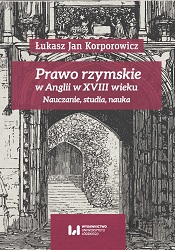
It was not until recently that the presence of Roman law in the history of English law started to gain popularity among scientists. Previous research had focused on historical issues and periods disconnected from one another. The eighteenth century had remained the most conspicuous research gap. The author of the publication conducted a discerning analysis of Roman law. He presented the history of the Regius Professorship of Civil (i.e. Roman) Law chairs in Oxford and Cambridge, as well as the attempts to teach the ancient legal code by civilists – civil law specialists – who were not associated with the university faculty. He also discussed the extant lecture materials. The author scrutinized the university legislation related to the conferral of bachelor’s and doctor’s degrees in jurisprudence at the two English universities, and also focused on the social impact of civilists. He also devoted a lot of space to the eighteenth-century English literature on Roman law. Lektura książki pozwoli spojrzeć na cywilistów jak na ważny człon intelektualnej elity Anglii. The book helps the reader recognize civilists as an important constituent of the intellectual elite of England.
More...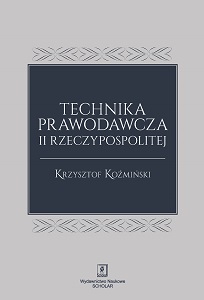
Słyszy się często opinię, że obowiązujące w Polsce prawo jest kiepskiej jakości: niejasne, wewnętrznie sprzeczne, napisane niezrozumiałym językiem, wyrażone nadmiernie rozwlekłymi przepisami. Podlega ciągłym zmianom, zawiera luki, nieuzasadnione wyjątki, a nawet rozwiązania retroaktywne. Stan prawodawstwa budzi słuszną krytykę ze strony obywateli, przedsiębiorców, komentatorów życia publicznego i samych prawników. Marnym pocieszeniem jest fakt, iż zarzut inflacji legislacyjnej formułuje się również w krajach zachodniej Europy, a prawo unijne bywa jeszcze ostrzej krytykowane. W tym kontekście wspominany jest nieraz „złoty okres polskiej legislacji”, czyli czasy Drugiej Rzeczypospolitej, z którymi kojarzy się działalność Komisji Kodyfikacyjnej i jej słynne dzieła, w tym Kodeks zobowiązań oraz tzw. kodeks karny Makarewicza.Niniejsza książka prezentuje odpowiedź na dwa zasadnicze pytania: na ile uzasadnione jest optymistyczne wyobrażenie o jakości polskiej legislacji dwudziestolecia międzywojennego oraz czy wypracowana sto lat temu technika prawodawcza zachowuje aktualność we współczesnych realiach Trzeciej Rzeczypospolitej.Sposób redagowania ustaw i innych aktów normatywnych należy do istotnych elementów prawnej i prawniczej tradycji poszczególnych państw. Obecny polski styl legislacyjny stanowi w dużym stopniu kontynuację reguł wypracowanych, nie bez trudności, w II Rzeczypospolitej – które zaczęto kodyfikować od 1929 r. Autor przedstawia kształtowanie się i stan z 1939 r., jak je już wówczas nazwano, „zasad techniki prawodawczej”, starając się uczynić to w sposób nie tyle systematyczny, ile tłumaczący źródła obecnych zasad techniki prawodawczej, które uznaje się za standardy prawidłowej legislacji, odpowiadające konstytucyjnej zasadzie demokratycznego państwa prawnego. Książka wypełnia tym samym odczuwalną lukę w naszej literaturze prawniczej.prof. dr hab. Hubert IzdebskiDzięki monografii autora przekonujemy się, że korzenie współczesnej techniki prawodawczej tkwią w czasach Drugiej Rzeczypospolitej. Już wówczas zdawano sobie sprawę z tego, jak ważna jest umiejętność prawidłowego formułowania przepisów prawnych. W najogólniejszym sensie stanowi ona przedmiot niniejszego opracowania. Autor omawia pierwsze uregulowania prawne oraz praktykę legislacyjną, a także wskazuje popełniane wówczas błędy. Opracowanie jest wartościowego również dlatego, że dotychczas zagadnienia z zakresu legislacji, zwłaszcza tej dawniejszej, nie były poddane tak rozległej analizie.dr hab. Izabela Lewandowska-Malec, prof. UJ-u
More...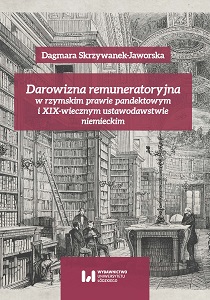
The presented scientific monograph is devoted to remunerative donation (serving to recompense, reward) understood as an assets transfer effected out of gratitude for the boon rendered to the donor or a favour performed on his behalf.The legal structure of this type of donation has a long and complicated history. The perception of its controversial, dual – lucrative and onerous – nature was already well-established in the Middle Ages and, present in the reception process of Roman civil law, has survived to this day.The interpretation of sources of Roman law, in particular the decisions of the jurists Papinian, Paulus and Ulpian, has a vital significance in the historical and legal discussion on this subject.The subject of the publication is the analysis of concepts regarding the nature of donatio remuneratoria, present in the discourse conducted in the field of the nineteenth-century German legal science, mainly among the representatives of the German Historical School and the Pandectists.Historical interpretation of section 534 German Civil Code (BGB) and Article 902 of the Polish Civil Code may be of interest not only to Romanists and historians of law, but also to dogmatists of civil law.
More...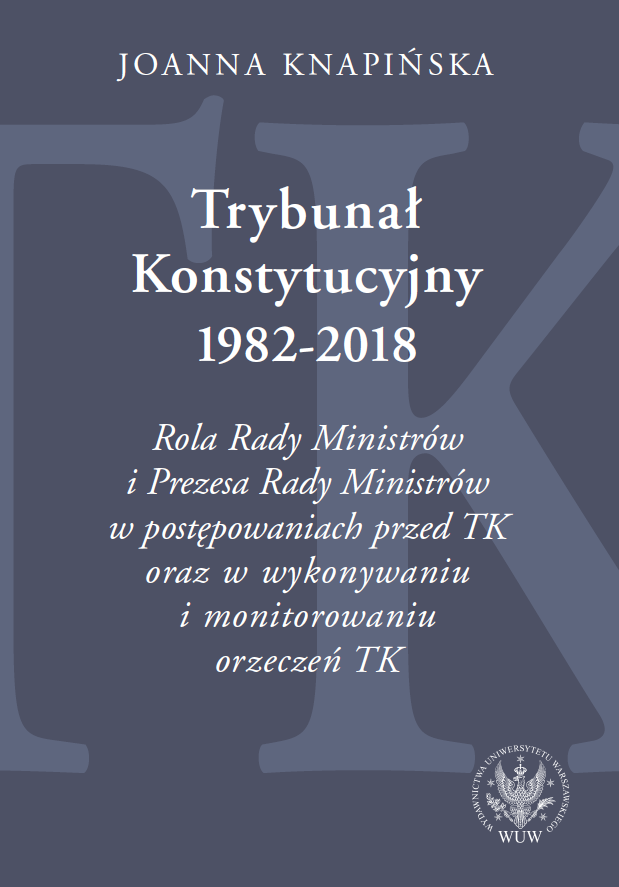
An analysis of the functions of the Council of Ministers, the Prime Minister and the members of the Council of Ministers in the course of the proceedings of the Constitutional Tribunal in the context of the institutional role of the Council and the PM, taking into account the diversity of the proceedings conducted by the Tribunal. A review of the issues of announcing and enforcing the rulings of the Tribunal, the impact of the rulings of the Tribunal on the body text of normative acts that are subject to its rulings, as well as the ways that the legal requirement of participation of the government in the proceedings of the Tribunal was fulfilled during the years 2015–2016.
More...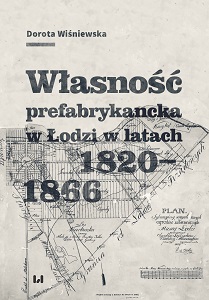
The monograph views the still-feudal Łódź as it began its ascent towards urban prominence and analyzes the legal phenomena which led to the development of ownership and of a capitalist society. The author describes relevant regulations in the legal system of the time, both those issued by the governing bodies in the Kingdom of Poland and ones resulting from market exchange praxis – which later translated into the setting up and rapid growth of Łódź as an early capitalist industrial city in 1820–1866. Owing to the unique mechanics of ownership existing in Łódź which started out as an urban aspirant in the shadow of the neighboring Zgierz, industry developed, small-scale producers began settling here, workshops were opened paving the way for the great manufacturers of later years who would employ thousands of workers. Divided ownership was a characteristic legal instrument that helped shape the transformation. It obtained mainly within the Old Town city area and drew heavily on feudal norms. At the same time, a new form of ownership was being created in the Łódź factory settlements: pre factory ownership. It carried its basis over from divided ownership but with the inclusion of numerous elements born out of the new system of economic relations.
More...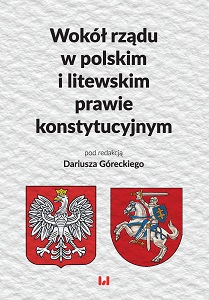
This book is concerned with topics related to the government in Poland and Lithuania. In the contemporary legal and constitutional literature, comparative research on this subject is rather scarce. The present publication is the outcome of cooperation between staff members of the Department of Constitutional Law of Lodz University and of the Department of Public Law of Vilnius University. As a result, three monographs have appeared: Aktualne problemy polskiego i litewskiego prawa konstytucyjnego (The current problems in Polish and Lithuanian constitutional law), Łódź 2015; Lietuvos ir Lenkijos konstitucinės teisės aktualijos: Parlamentas (The current topics in Polish and Lithuanian constitutional law: parliament), Vilnius 2016; and Instytucja prezydenta w polskim i litewskim prawie konstytucyjnym (Presidency in Polish and Lithuanian constitutional law), Łódź 2017. Prof. zw. dr hab. Dariusz Górecki
More...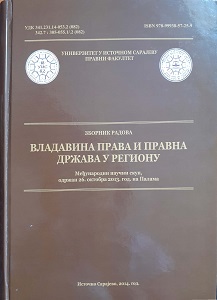
This work is dedicated to late-roman institution called defensor civitatis (protector of citizens). It was a public official whose primary role was to protect citizens from abuses by both municipal (local) and state authorities, which influenced the development of modern institutes such as the Ombudsman and the like. The paper also draws attention to a little known fact that the institute was first established in Illyria, which roughly corresponds to today's Western Balkans, and the former Yugoslavia, from where it was later extended to the whole Empire. The author analyzes the circumstances and reasons for, and the way of creating the institution of defensor civitatis, and its further functioning.
More...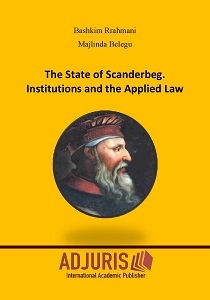
The book presents some selected thoughts and writings about the creation of the State of Scanderbeg and the law applied during the life of this state. At the center of the paper is presented the way and the reasons which led towards the creation of the state of Scanderbeg along with the main features of this state, including state institutions, as well as the law created and applied in the territories of this state. The authors contextualize this within the framework of the work that was done by several known authors that have dealt with Scanderbeg. Altogether have described Scanderbeg using various resources but with different methods which lead to a conclusion that Scanderbeg was one of the most important personalities in the fifteenth century who managed to stop Turkish invasion towards the west for 25 years. Thus the attributions as new Alexander the Great or the Athlete of Christ stand rightfully to this person who by created a unique state standing the in first line of front against the ottoman invasion.
More...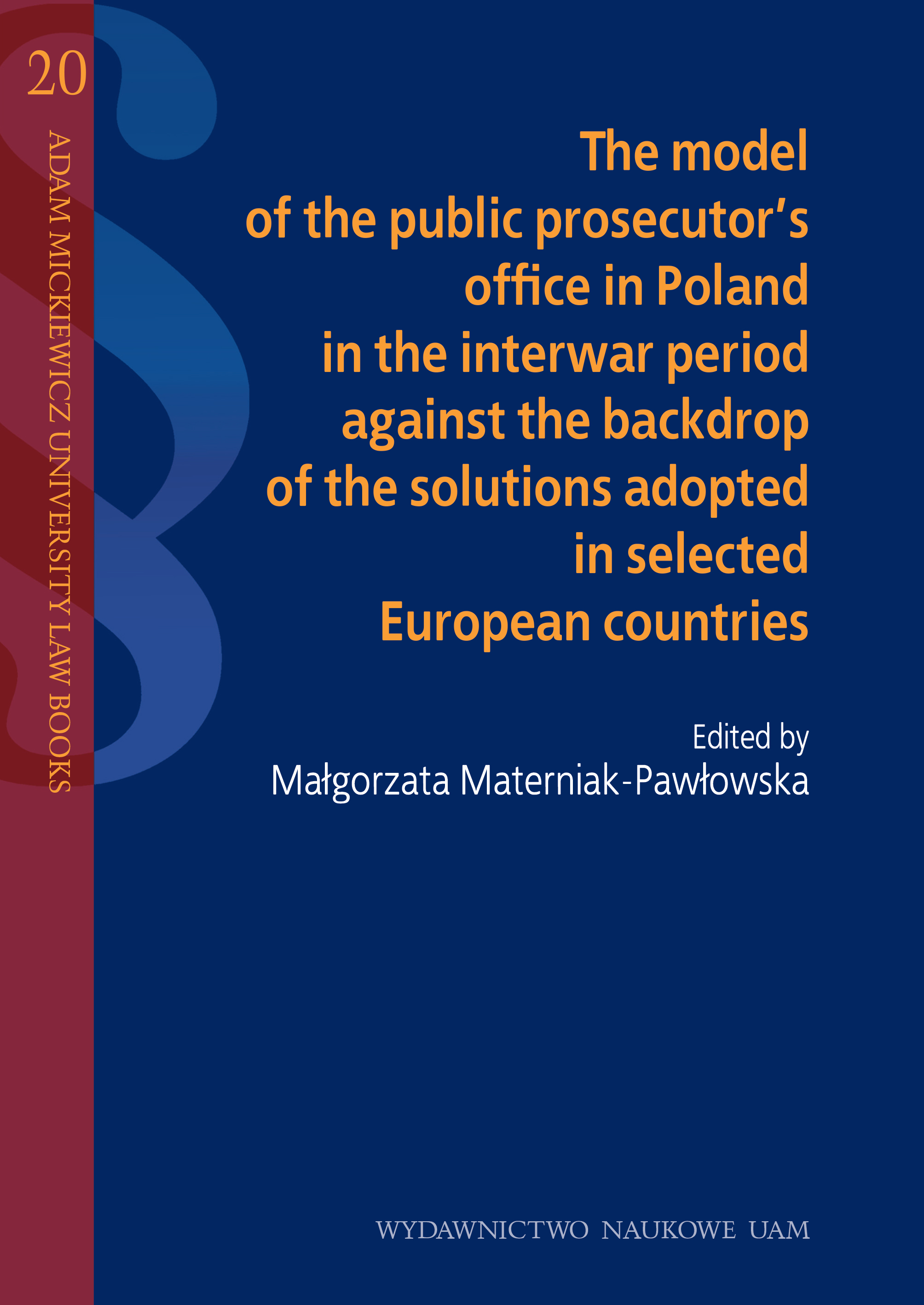
The monograph describes the model of the system of the Polish public prosecutor's office in the interwar period, including its position in the system of justice system bodies and its place in the system of state bodies in general, as well as the legal basis of its functioning and the most important organizational principles. This model is presented against the backdrop of different European solutions from this period, namely the German, French, and Czechoslovakian ones. It is the first work in Polish to deal with this issue in a comprehensive and comparative manner in the history of Polish historical and legal bibliography.
More...